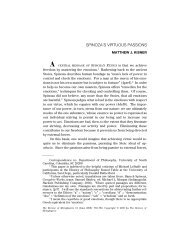heidegger's being and time and national socialism - Philosophy ...
heidegger's being and time and national socialism - Philosophy ...
heidegger's being and time and national socialism - Philosophy ...
Create successful ePaper yourself
Turn your PDF publications into a flip-book with our unique Google optimized e-Paper software.
sary for arriving at home, the fallen German soldiers<br />
of World Wars I <strong>and</strong> II—without mentioning<br />
the Jews. 169 Under the reign of enframing,<br />
whatever happens in modernity—“it is all the<br />
same.” Still, the deeds of the National Socialists<br />
had gone by while the nuclear bombs <strong>and</strong> energy<br />
plants produced by the USA <strong>and</strong> the empire of<br />
the Soviet Union represented an enduring threat.<br />
Thus, in the talks, between 1949 <strong>and</strong> 1953, that<br />
became The Question concerning Technology<br />
<strong>and</strong> related texts, he encouraged the Germans to<br />
focus on the reconstruction of their economy <strong>and</strong><br />
the dangers posed by the USA <strong>and</strong> the Soviet Union,<br />
<strong>and</strong> he tried “to silence Auschwitz silently.”<br />
170<br />
“Anticipation of Death” after Hitler’s<br />
“Seizure of Power”<br />
His penchant for the dead German soldiers<br />
goes back to the <strong>time</strong> between the two wars. As to<br />
resoluteness, I pointed out already in Historical<br />
Destiny <strong>and</strong> National Socialism in Heidegger’s<br />
Being <strong>and</strong> Time that the translators render as “anticipation<br />
of death” Heidegger’s expression<br />
Vorlaufen in den Tod, literally translated “running<br />
forward into death”; that the English translation<br />
takes out the gist—the peculiar temporal<br />
<strong>and</strong> spatial “choreography”—of the German expression;<br />
that when reading “Vorlaufen in den<br />
Tod” German readers of Being <strong>and</strong> Time in the<br />
1920s could not but think of the so-called “heroes<br />
of Langemarck”; <strong>and</strong> that one could take these<br />
heroes as the methodological ideal type to interpret<br />
Heidegger’s concept of resoluteness. 171<br />
World War I was the first war characterized<br />
largely by trench warfare. The front lines hardened<br />
quickly. Entrenched, the armies lay opposite<br />
each other, <strong>and</strong> this situation could have gone<br />
on for years <strong>and</strong> years. According to the legend,<br />
however, already in October 1914 the “heroes of<br />
Langemarck”—young German students, most of<br />
them volunteers—had stepped out of the<br />
trenches into the open <strong>and</strong>, with the German <strong>national</strong><br />
anthem on their lips, had run toward the<br />
French trenches. In terms of military strategy,<br />
this was sheer suicide <strong>and</strong> completely counterproductive.<br />
Nonetheless, or precisely because of<br />
PHILOSOPHY TODAY<br />
272<br />
this, they became the shibboleth of the rightwing<br />
foes of the Weimar Republic, the shining<br />
example of the unsurpassable sense of duty, sacrifice,<br />
<strong>and</strong> community characteristic of a “true<br />
German.” The Weimar Republic had to be destroyed<br />
to make good on the promise of these<br />
brave German soldiers betrayed by the liberals,<br />
the social democrats, <strong>and</strong> the Jews. 172<br />
In his speech as rector of the university at the<br />
matriculation ceremony on November 25, 1933,<br />
Heidegger pointed to the “irresistible process of<br />
the arrival of a new German reality” <strong>and</strong> said that<br />
this fact “causes the German student to line up for<br />
a new, though bloodless, march of sacrifice. We<br />
will therefore devote today <strong>and</strong> in the future this<br />
celebration to the actuality of Langemarck <strong>and</strong><br />
conduct it under the symbol of Langemarck.” 173<br />
Most probably, it was his own idea to make the<br />
students repetitions of the German soldiers at<br />
Langemarck. He definitely did not follow any<br />
state order when, in the lecture course on<br />
Hölderlin in winter 1934–35, he used again the<br />
notion of sacrifice for the German soldiers. He<br />
quotes a subordinate clause of an unfinished<br />
poem by Hölderlin that runs, literally translated,<br />
thus: “Since we have become a conversation <strong>and</strong><br />
are able to hear from / of each other.” 174 He adds<br />
to Hölderlin’s subordinate clause a main clause,<br />
<strong>and</strong> comments as follows:<br />
Since we are a conversation, we are placed into,<br />
<strong>and</strong> at the mercy of, the <strong>being</strong> as it reveals itself; it<br />
is only since then that the Being of the <strong>being</strong> as<br />
such can encounter <strong>and</strong> determine us. The fact,<br />
however, that the <strong>being</strong> as to its Being is unconcealed<br />
in advance for each of us, is the presupposition<br />
for <strong>being</strong> able to hear from the other something;<br />
that is, something about some <strong>being</strong>,<br />
whether this <strong>being</strong> is what we are not—that is, nature—or<br />
whether it is what we ourselves are—that<br />
is, history. 175<br />
In the next paragraph, Heidegger adduces the notions<br />
of community <strong>and</strong> society:<br />
The ability to hear by no means produces the relation<br />
of the one to the other, that is, the community<br />
[Gemeinschaft]. Rather, the ability to hear presupposes<br />
the community. This primordial community<br />
by no means originates through entering into a re-
















